- Home
- Brian Garfield
Line of Succession Page 6
Line of Succession Read online
Page 6
And Fitz Grant demanded in a voice like an Indiana hog caller’s, “Jesus God damn Christ what in the hell is all this?”
“Are you all right?” Ethridge said in awe.
Grant’s sad drinker’s eyes focused slowly upon him.
The slow splendid deep voice rolled out with full strength: “When I’ve made an inventory of my bones I’ll let you know, Mr. Vice-President. But in the meantime how in the hell did we get here and what in the hell is this? Limbo, by the Lord! The ninth circle? My good Faust—lead me the hell out of here!”
8:10 P.M. Continental European Time The four Secret Service agents rattled around the sitting room of Fairlie’s suite, restive and suspicious and angry, and his aide Liam McNeely for once in his life was sitting up straight in a chair, with his slim boudoir face poked defiantly toward the radio and the booming voice of the BBC Home announcer.
Clifford Fairlie walked across the room and his hands reached up to draw the drapes against the misty chill darkness of the Parisian night but his eyes were not focused on anything much at all; he was listening—to the droning radio and for the telephone’s bell.
He shambled to the highboy and poured an ounce of Dubonnet into a crystal aperitif glass with the hotel’s monogram on it. Walked to the radio and fiddled with the tuning dial but effected no improvement in the background static. The French radio was carrying the story as well but Fairlie did not want to concentrate on translating in his head.
He prowled the room now, too eruptive to sit still, sipping the Dubonnet until it was gone, after which he carried the empty glass around with him, rotating it between his palms. McNeely’s head kept turning, indicating his attentiveness to fairlie’s movements, but neither McNeely nor the Secret Service agents spoke: either they were too stunned by the news or they were awaiting a cue from Fairlie.
“… complete listing of casualties has not yet been released, as it is understood the authorities are still sifting through the rubble of the two legislative chambers of the American Congress which were bombed little more than ninety minutes ago. Of course the President-elect, Mr. Fairlie, was not in Washington, and his Vice-President-elect, Mr. Ethridge, is reported to have escaped serious injury although he was present in the Senate when the powerful devices were detonated.”
It penetrated Fairlie’s consciousness that the British Broadcasting announcer was winging it: tossing out time-consuming bits of background information to fill the time because he had run out of hard news to report, then swinging back into the bits and pieces that had come in on the international newswires and recapitulating the story which by now everyone in the world had heard.
“It was announced officially by the White House Press Secretary, Mr. Hearn, that swift action by the United States Secret Service resulted in the capture of six suspected terrorists almost immediately after the explosions in the American Capitol. According to Mr. Hearn five of those arrested actually planted the five explosive devices, and the sixth was the driver of their escape car. Names and descriptions of the six have not been divulged, but Mr. Hearn did reveal they are three men and three women. Whether the Government suspects that more than these six were involved in the.… One moment, please. We have only just received this. The Director of the FBI, who has been placed in charge of rescue and investigative operations at the bombed Capitol building in Washington, has authorized the release of a preliminary list of casualties. We are advised the list will be read out by the President’s news secretary, Mr. Hearn, in just a few minutes’ time. BBC is now preparing to switch us via satellite to live coverage of Mr. Hearn’s briefing in Washington.”
There was an obsequious knock. McNeely rose with alacrity and two of the agents went with him to answer the door. It was the hotel manager, wheeling a large television console. Fairlie thought irritably that it had taken the hotel almost three quarters of an hour to locate and deliver the television set to his room—probably the same set he had had removed the day of his arrival because he detested television and found French television to be a particular abomination.
The hotel manager backed out of the room after whispering something in McNeely’s ear. The agents turned to stare at the warming TV screen, and McNeely said to Fairlie, “He says the place is crawling with reporters and the rumor’s around that you’re going to make a statement.”
“Not just yet.”
“I hope they don’t think of bringing a battering ram.” McNeely didn’t smile; he only flopped into his chair and brooded toward the screen.
The telephone.
McNeely bounced up and Fairlie watched him with care. He had left instructions with the switchboard to connect no incoming calls except from President Brewster, who had called an hour ago and asked him to stay on tap.
McNeely covered the mouthpiece with his palm and gave Fairlie an unreadable look. “It’s the girl on the switchboard. She’s holding a call for you from Harrisburg.”
“Jeanette?”
“Yes. Evidently she’s been trying to get through to you for more than an hour. I gather she’s blistering the corns off the poor girl on the board.”
That wasn’t hard to credit. Fairlie approached the phone, moving awkwardly sideways to keep the TV screen in view. It was French television of course and the sound was down very low; he could hear the BBC radio announcer introducing Perry Hearn and on the screen he could see the satellite picture of the White House Lawn, gray on a misty cold afternoon with a thick crowd waiting, breath pouring like steam from their nostrils.
“Jeanette?”
“One moment please.” An American operator’s voice.
“Cliff darling?”
“Hi sweet.”
“My God what trouble I’ve had reaching you. I finally had to pull rank—the President’s wife is calling, I told them. It sounded God-awful to me.”
“How is it there?”
“It’s madness, Cliff. You can’t imagine it. I think the whole city’s glued to their television screens as if they were bleeding to death and the tube was their transfusion bottle.”
“There hasn’t been any trouble, has there?”
“Outside of the Hill, you mean. No. I don’t think anybody’s thought of making trouble. We’re all too numb.” It was a good clear connection but she was pitching her voice high and loud as if to span the intercontinental vastness.
The TV had gone to a tight closeup of Perry Hearn’s amiable bland face and the radio carried Hearn’s voice but they were somewhat out of sync, the radio voice anticipating the movements of Hearn’s lips on the screen by a half second. As of now thirteen Senators and twenty-eight Congressmen are still missing.…
“Are you all right, sweet?” He had turned his shoulder to the others in the room and spoke low, confidentially into the telephone.
“Oh I’m all right, Cliff. Just overwrought. The little one’s kicking inside me—I guess he can sense my excitement.”
“But you’re all right.”
“I’m fine. Really, darling.”
“That’s all right then.”
… list as of now includes ten United States Senators and thirty-seven members of the House of Representatives, whose bodies have been identified.…
“I suppose I’ve been trying to call you because I don’t know what else to do. I needed your voice, Cliff.”
“Have you got people there with you?”
“Oh yes of course, everyone’s descended on me. Mary came over the instant she heard the news and the children are both with me. I’m very well looked after.”
… Speaker of the House Milton Luke escaped injury and is with the President at this moment. Senate Majority Leader Winston Dierks suffered a leg injury but is listed as being in satisfactory condition at D. C. General Hospital. Senate Minority Leader Fitzroy Grant will probably be released from Walter Reed Army Hospital within a few minutes.…
“… wish I weren’t preggers, Cliff, I wish I were there with you.”
She had lost a baby two years ago and this time they had decided she
would stay at home and not travel with him. Fairlie said, “Do you want me home?” and hated himself for it, knowing his decisions couldn’t be based on her wishes.
“Of course I do,” she replied; the softness of her voice was freed of sentimentality by its flavor of affectionate ridicule: she knew as well as he did that he wouldn’t drop everything and fly straight home on her whim.
… ter Ethridge will remain in Walter Reed Army Hospital overnight for observation and tests, but he appears to have nothing worse than a few contusions, and his physician says he’s in the very best of health. The Reverend Doctor John Mosley, Chaplain of the House of Representatives, is on the critical list at.…
“… but I couldn’t very well ask it of her.”
“What?”
“Oh darling you’re not listening, are you. It doesn’t matter. I was only saying Mary’s offered to pack an overnight bag and move over here for a few days to help look after the children.”
“Might not be a bad idea, you know.”
“I think I’d rather bear my grief in private, Cliff. We’ve lost an awful lot of friends today.”
“Yes,” he said. “Yes.”
… brunt of the casualties has been borne by Washington’s press corps, for which the President is deeply grieved. At present it is known that seventy-one reporters lost their lives in the disaster…
He said, “Do you have the television on?”
“Yes, I’m watching it with one eye.”
“Doesn’t Perry Hearn look terrible?”
“I know. Midge Luke called me a little while ago, just to say Milt wasn’t hurt and she was so glad you weren’t there, and Milt told her the President looks like the last survivor of an Infantry patrol in some muddy trench. My God, Cliff, how can it have happened?”
… Capitol Building. Emergency crews under the direction of Capitol Architect James Delaney are already shoring up the chambers, but until a thorough survey has been made we’re assuming the entire building is unsafe, and all individuals and offices are being evacuated into temporary.…
Jeanette’s voice continued on the wire and he wasn’t really listening to her words but he heard her voice, her tone, the soft warm nesty feeling she created so easily; it occurred to him that her real reason for calling him was not so much to reassure herself as it was to remind him of their unbroken romantic communion—to give him that to lean on; so that suddenly he felt a quick welling in his throat of gratitude and adoration.
… President will speak to the nation this evening at seven o’clock eastern standard time.…
“I’d better ring off, sweet. I’m expecting word from President Brewster.”
… ordered flags to fly at half-mast until further.…
“Do you think he’ll ask you to come home?”
“I don’t know. We talked about it and he said he’d get back to me.”
“What do you think you should do, Cliff?”
“If they’d hurt Dex Ethridge at all of course I’d have had to come right home, but he appears to be all right, and since they’ve caught the perpetrators I doubt there’ll be any need for me to——what?”
“I couldn’t hear you for a minute. The connection seems to be fading. I guess I’d better get off the line now. But call me when you’ve got it decided. Love me?”
“Love you,” he said very soft into the phone cupped against his shoulder. He heard the click and the static of the transatlantic cable.
… list of the dead includes Senators Adamson, Geiss, Hunter, March, Nugent.…
His hand rested on the cradled phone as if to retain the thread of contact with Jeanette. He looked up. Ordway, Oxford, Robinson, Scobie, Tuchman.… Perry Hearn’s mouth, moving not in synchronization with his radio voice, was an evil ugly thing and Fairlie wrenched his eyes away from the screen and carried his glass to the Dubonnet bottle.
Jeanette: soft lips and upswept hair. Not that much different from the girl he had courted back in the medieval days when you still courted girls: she had been a psych major at Vassar in pleated skirt and saddle shoes and for six months she had returned his weekend invitations unopened because when a Vassar girl received anything with a Worcester postmark she knew it was from a Holy Cross man and Vassar girls did not date Holy Cross men. Finally a classmate had informed Fairlie of this and he had had the presence of mind to drive over to Cambridge to mail the next invitation. She must have received that one: at least it was never returned to him. But there was no reply. That summer he wrote two invitations from his home outside Cheyney, Pennsylvania. These she had regretted with formal little notes. Finally in the fall he had prevailed upon a botany professor who was going off on sabbatical. The professor had taken the sealed envelope and agreed to post it. A week later Fairlie won: a phone call from Vassar—“What on earth were you doing in Alaska?”
After his first year at Yale Law she had agreed to marry him. After his second year she had married him. After the bar exams he had moved her to Cheyney and she had fallen in love with the place, the great trees, the rolling hills, the struggling Negro college and its eagerly tutorable students.
Young with childless zeal she had become compulsively tidy and organized. She took to making lists of things to do and things for Fairlie to do; she posted them on the refrigerator door, boldly penned in her expansive hand. Finally he had cured her by appending an item to her itemized list: 9) Check likelihood of obsessive list-making on part of second wife.
They were an idyllically and atypically happy couple. The children had come soon—Liz was now fourteen, Clay was going on ten, which was to say he was more than six months past his ninth birthday—and the pressures of twenty-four-hour politics had had inevitable effects on the fabric between them, but their respect for each other’s individuality and their private sense of humor had secured them pretty well: once last fall he had got up early to dress for a campaign breakfast and when he was ready to leave the hotel suite he had crept into the bedroom where she was half asleep, and had nibbled her ear and caressed her breast and when she made a low smiling throat-sound he had whispered in her ear, “Where’s Cliff?” and she had shot bolt upright and yelled. She had scolded him for weeks about that, but each time with laughter.
“President Brewster.”
He looked up. It was McNeely, holding the phone out toward him. Fairlie hadn’t heard it ring. At least McNeely hadn’t said, “It’s the pisspot Napoleon.”
He took the receiver from McNeely and said into the mouthpiece, “Fairlie here.”
“Hold on please, Mr. Fairlie.” Brewster’s secretary.
Now the President came on the line. “Cliff.”
“Hello Mr. President.”
“Thanks for waiting.” An unnecessary courtesy: where would Fairlie have gone? Howard Brewster’s flat Oregon twang sounded very tired: “Bill Satterthwaite’s just talked to them over at Walter Reed. Old Dex Ethridge is fine, just fine.”
“They’re releasing him, then?”
“No, they want to hang onto him for a day or so, run him through that damned battery of tests they like to do.” He could almost hear the President shudder over the six-thousand-mile telephone wire. “But there’s nothing wrong with Dex, he’s fine and dandy. I always said it’d take more than a whap on the head to do any damage to a Republican.”
Fairlie said, “It’s that elephant hide we all wear.”
There followed Brewster’s energetic bark of laughter and then a ritual clearing of throat, and Brewster said in his matter-of-fact voice, “Cliff, I’m going to talk to the people tonight. It’ll be pretty late your time but I’d appreciate it a whole lot if you’d hold off on making any kind of statement until after I’ve made mine.”
“Of course, Mr. President.”
“And then I’d be truly obliged if you’d step out and back me up. We need to have a pretty good show of solidarity on this thing.”
“I can see that,” Fairlie said—cautious, not wanting to commit himself to a blank-check promise. “Do you m
ind if I ask what the substance of it will be?”
“Don’t mind a bit. “Brewster dropped into his man-to-man confidential voice:
“I’m going to talk tough, Cliff. Very tough. There’s a lot of screwballs out there with loud voices and I don’t think we can afford to give them time to start broadcasting conspiracy alarms and sniping at us the way they did when JFK was shot. There’s a risk of panic here, and I mean to head it off.”
“By doing what, Mr. President?’’ Fairlie felt the fine hairs prickle at the back of his neck.
“We’ve just had an emergency meeting of the National Security Council together with various interested parties—the Speaker, some others. I’m declaring a state of national emergency, Cliff.”
After a moment Fairlie said, “I thought you’d captured the bombers.”
“Well, we’ve got some pretty damn fast T-men and thank God for them. They nailed those degenerate savages before they’d got two blocks from the Hill.”
“Then what emergency are we talking about?”
“There’s some others mixed up in this thing—five or six that didn’t get caught, maybe more.”
“You know that for a fact?”
“Yes. I do. We do know there were more people involved in this than we actually caught at the scene.”
“You’re declaring a national emergency mainly to hunt down a handful of co-conspirators?”
“Well, we don’t know how many they are, but that’s beside the point, Cliff. The thing is, we’ve been rocked by this. Warshington’s out of kilter. Now God knows how many other groups of vicious animals we’ve got out there in the woodwork—suppose they decide it’s time to jump on the bandwagon and whip up this big revolution they’re always yelling about? What if they get the violence stirred up until we’ve got riots and snipers and bombs crawling out from under rocks in every city and state across the country? We’ve got to forestall that, Cliff, we’ve got to demonstrate that this government’s still vigorous enough to react speedily and decisively. We’ve got to defuse the savages, we’ve got to show a little muscle.”
“Mr. President,” Fairlie said slowly, “I’m beginning to get the feeling you’re talking about a wholesale nationwide roundup of suspicious characters. Is that what you mean when you talk about a national emergency? Emergency powers?”

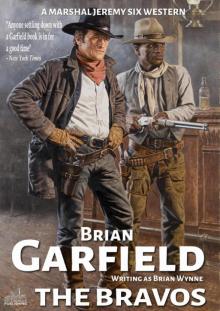 Marshal Jeremy Six #3
Marshal Jeremy Six #3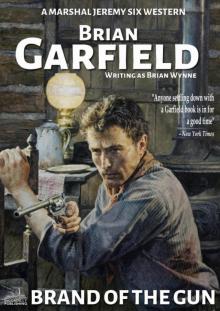 Marshal Jeremy Six #6
Marshal Jeremy Six #6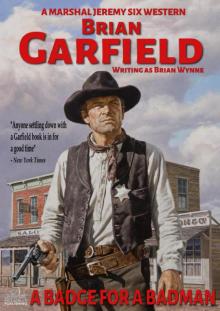 Marshal Jeremy Six #5
Marshal Jeremy Six #5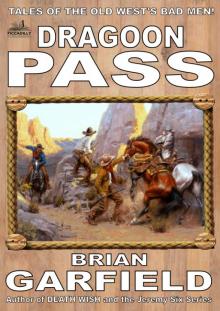 The Outlaws 2
The Outlaws 2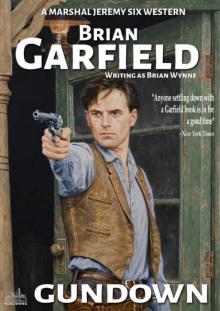 Marshal Jeremy Six #7
Marshal Jeremy Six #7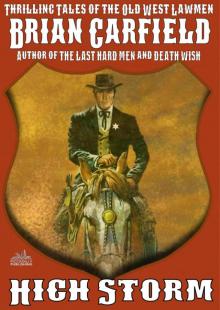 The Lawbringers 4
The Lawbringers 4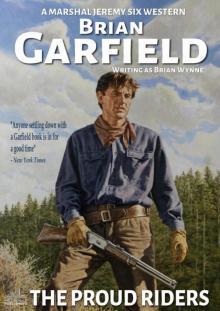 Marshal Jeremy Six #4 the Proud Riders
Marshal Jeremy Six #4 the Proud Riders The Romanov succession
The Romanov succession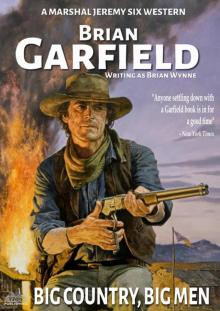 Marshal Jeremy Six #8
Marshal Jeremy Six #8 Sliphammer
Sliphammer Line of Succession
Line of Succession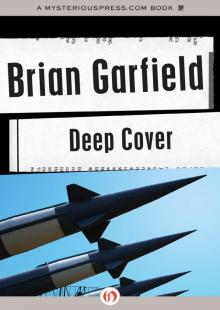 Deep Cover
Deep Cover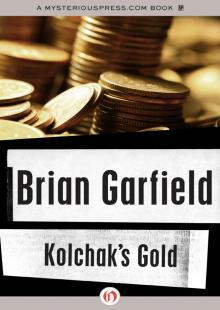 Kolchak's Gold
Kolchak's Gold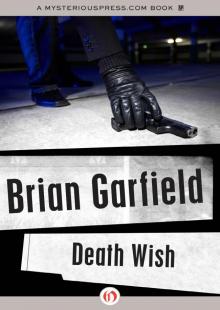 Death Wish
Death Wish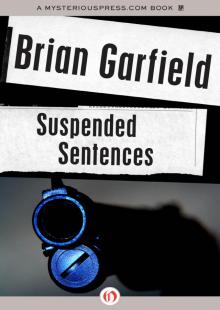 Suspended Sentences
Suspended Sentences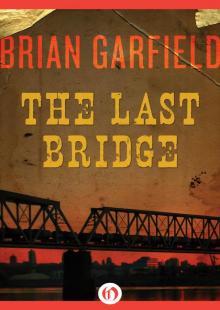 The Last Bridge
The Last Bridge Relentless
Relentless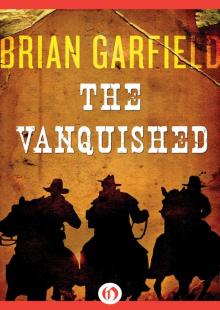 The Vanquished
The Vanquished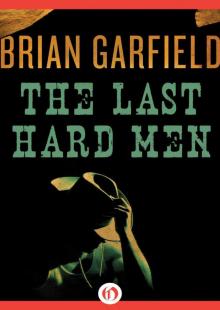 The Last Hard Men
The Last Hard Men Hit and The Marksman
Hit and The Marksman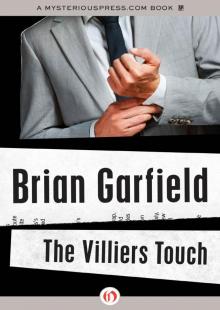 Villiers Touch
Villiers Touch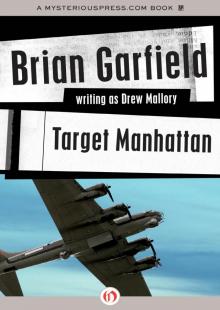 Target Manhattan
Target Manhattan Marchand Woman
Marchand Woman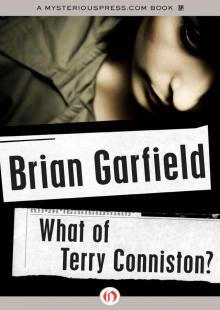 What of Terry Conniston?
What of Terry Conniston?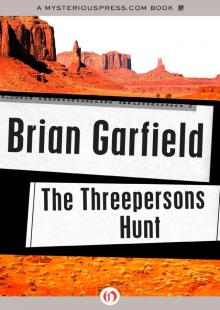 Threepersons Hunt
Threepersons Hunt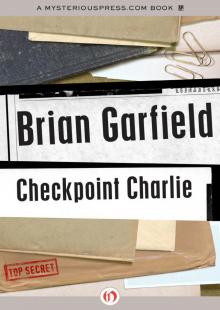 Checkpoint Charlie
Checkpoint Charlie Romanov Succession
Romanov Succession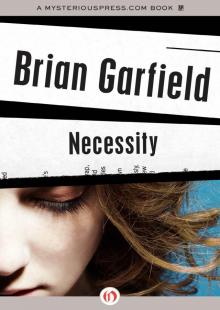 Necessity
Necessity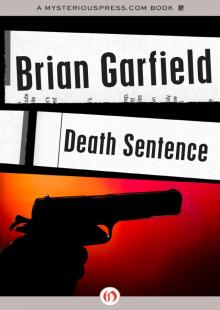 Death Sentence
Death Sentence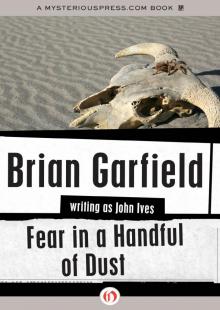 Fear in a Handful of Dust
Fear in a Handful of Dust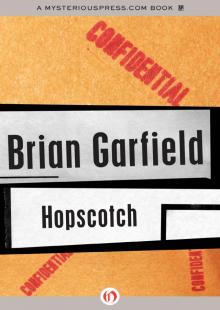 Hopscotch
Hopscotch